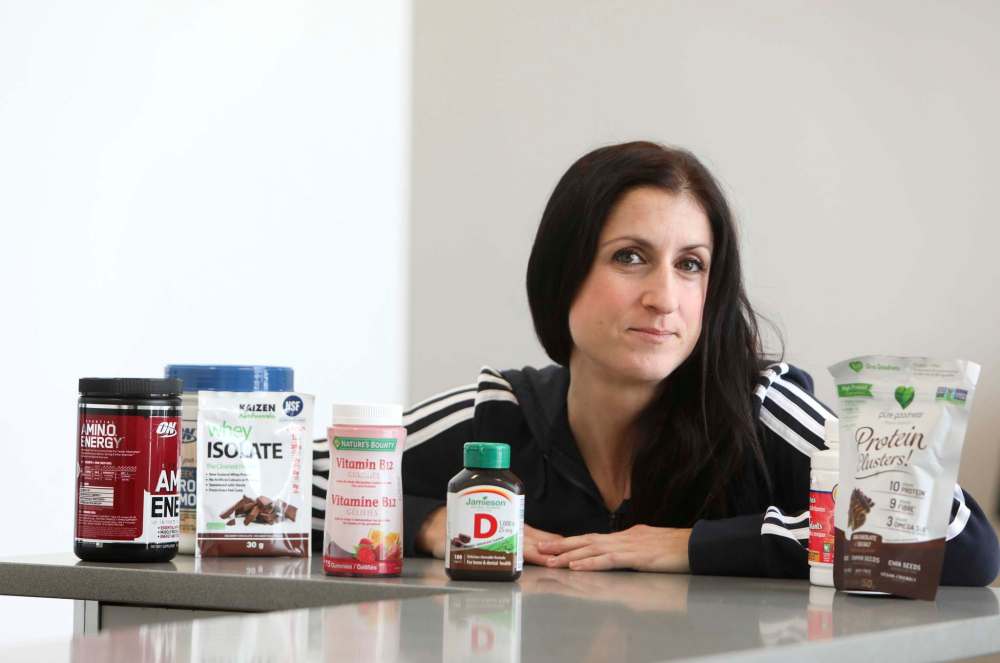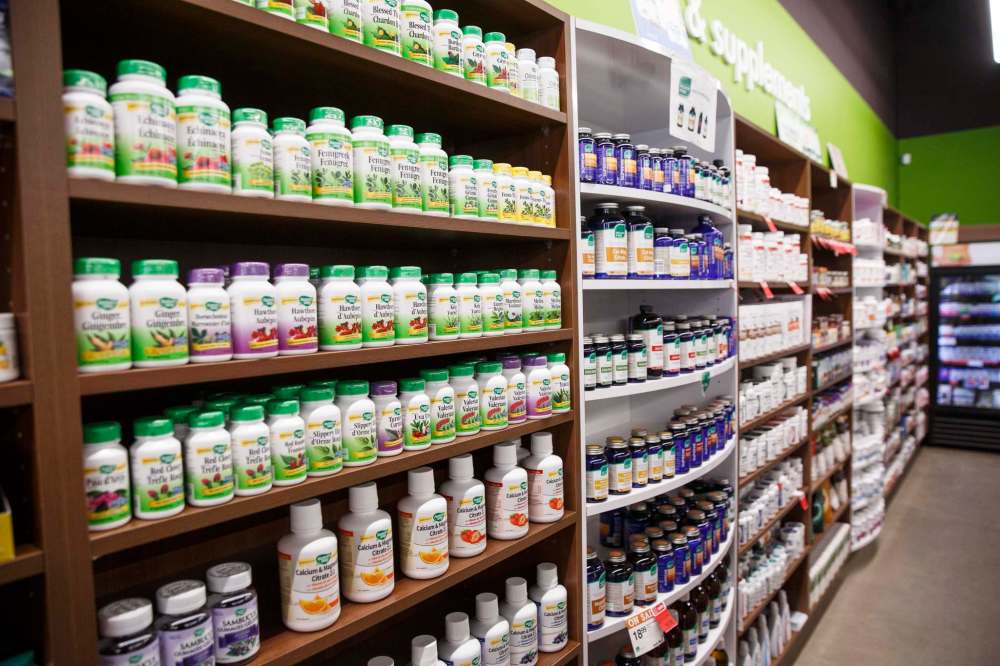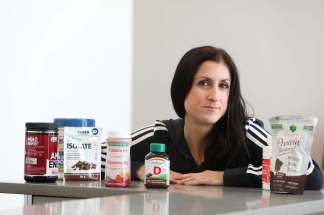Keeping your balance A vitamin supplement can be helpful — just remember more is not necessarily better
Read this article for free:
or
Already have an account? Log in here »
To continue reading, please subscribe:
Monthly Digital Subscription
$0 for the first 4 weeks*
- Enjoy unlimited reading on winnipegfreepress.com
- Read the E-Edition, our digital replica newspaper
- Access News Break, our award-winning app
- Play interactive puzzles
*No charge for 4 weeks then price increases to the regular rate of $19.00 plus GST every four weeks. Offer available to new and qualified returning subscribers only. Cancel any time.
Monthly Digital Subscription
$4.75/week*
- Enjoy unlimited reading on winnipegfreepress.com
- Read the E-Edition, our digital replica newspaper
- Access News Break, our award-winning app
- Play interactive puzzles
*Billed as $19 plus GST every four weeks. Cancel any time.
To continue reading, please subscribe:
Add Free Press access to your Brandon Sun subscription for only an additional
$1 for the first 4 weeks*
*Your next subscription payment will increase by $1.00 and you will be charged $16.99 plus GST for four weeks. After four weeks, your payment will increase to $23.99 plus GST every four weeks.
Read unlimited articles for free today:
or
Already have an account? Log in here »
Hey there, time traveller!
This article was published 11/02/2019 (2498 days ago), so information in it may no longer be current.
Vitamins — our bodies can’t function without them.
We need them to be healthy, but whether you pop one pill a day or swallow a handful every morning, there are some common misconceptions when it comes to the types of vitamins and supplements we should be taking.
Vitamins are nutrients our bodies need for proper cell growth, function and development. There are 13 in total: A, C, D, E, K, B1, B2, B3, pantothenic acid, biotin, B6, B12, and folic acid. Leftover water-soluble vitamins (such as vitamins C and B) are excreted, but fat-soluble vitamins (such as vitamin D and A) are stored in the liver and fatty tissues.

The best way to get enough of these vitamins is to eat a balanced diet from a variety of foods. Health Canada says controlling the addition of vitamins and minerals to our foods — a process known as fortification — is one way to ensure Canadians receive the nutrients they need. But, in some cases, that’s easier said than done.
“While it’s ideal to try to meet your daily vitamin and mineral requirements from food alone, for some people, this isn’t always easy to do,” says Shea Wolff, a private practice registered dietitian in Winnipeg.
“Women who are pregnant, might get pregnant, or who are breastfeeding must make sure they are getting enough folic acid, iron, calcium and vitamin D. And people who are sick or injured may need extra nutrients for healing,” she says.
If you have a vitamin deficiency, you’ll likely have a sense something is off. A deficiency in B12 can cause tingling hands and feet, confusion and memory loss, while an iron deficiency can lead to certain types of anemia.
The symptoms of a nutritional deficiency, Wolff says, depends on which micronutrient the body lacks. Some general symptoms people may experience include fatigue, weakness, hair loss, heart palpitations, depression or poor concentration.
Wolff recommends both iron and B12 for people who don’t eat a variety of foods, have food allergies or are vegans and vegetarians, since B12 is found in most animal-based foods like meat, eggs and dairy.
According to Statistics Canada, in 2015, 45.6 per cent of Canadians aged one year and older — approximately 15.7 million — used at least one nutritional supplement in the past month. And nearly 45 per cent of children aged 1-8 years take nutritional supplements.
“Vitamins and minerals are important for healthy growth and development in children, including iron, vitamin D and Omega-3 fatty acids (DHA/EPA),” Wolff says. “Children who have a poor appetite, drink a lot of sugar-sweetened beverages, take certain medications or have chronic medical conditions that interfere with intake, may need a supplement.”
More than three-quarters of American adults — that’s more than 170 million people — take dietary supplements, according to a 2017 Council for Responsible Nutrition Consumer Survey on dietary supplements. That’s up from 64 per cent in 2008.
But too much of anything can be dangerous. With vitamins, it’s a good idea to follow the “less is more” rule.
“Some people think if a little is good, then more is better. But nutrients can be harmful when taken in amounts above what’s considered beneficial,” Wolff says.
‘(A multi-vitamin) is an easy and safe thing you can take to help ensure you’re getting a broad range of daily nutrients.’ — Mathew Holtmann, owner and president of Vita Health Fresh Market
Most vitamins have a range that starts with the daily minimum that you should take every day — the recommended dietary allowance, Wolff says. That’s the amount you need to keep healthy and stay well-nourished. The top of that range is called the tolerable upper intake level, which is the maximum amount you can safely take without risk.
When shopping for supplements, it can be easy to become overwhelmed when staring down the vitamin aisle.
“The most important thing I tell a consumer is to introduce one supplement at a time because you’re the best judge of what’s working for your body,” says Mathew Holtmann, owner and president of Vita Health Fresh Market.
Holtmann grew up in the health industry. His grandfather, G.W. Seier, founded Vita Health Products in Winnipeg in 1936 as a small, mail-order operation that sold herbs and patented medicines. Six decades later, his father, John, purchased the retail stores in 1997. Matthew Holtman has been president and owner for the last nine years.

But vitamins aren’t a silver bullet to make up for a poor diet and nutrients in supplement form are not replacements for healthy food.
“Supplements do not provide our bodies with proteins, healthy fats or fibres. Vegetables, fruits, beans, nuts and whole grains also supply antioxidants and disease-fighting phytochemicals,” Wolff says. “And taking a multi-vitamin does not mean you don’t have to eat healthy. It can, however, be an insurance policy for days that your diet is not perfectly well-rounded.”
In 2015, StatsCan found multivitamins were the most common nutritional supplement used by Canadians.
“(A multi-vitamin) is an easy and safe thing you can take to help ensure you’re getting a broad range of daily nutrients,” Holtmann says.
There are things to consider before taking vitamins and supplements. First, check the expiration date. Wolff says it’s important to not purchase vitamins that have expired as they can lose their potency over time.
Also, ensure products have a Natural Product Number, or NPN, which means the supplement meets Health Canada’s standards for safety, quality and health claims.
Vita Health does not sell any products without an NPN.
“We encourage these legislations so people can have confidence what they’re buying is a legitimate product that will work,” Holtmann says.
The challenge is there are no restrictions on products coming across the border and, for Holtmann, that’s a problem as people then open themselves up to risk.
Whether you’re beginning a new health journey or well versed in the supplement industry, Holtmann has some healthy advice.
“Everyone wants a magic pill that will fix their problems and it just doesn’t exist. I encourage people to challenge themselves,” he says. “And if they haven’t found the answer yet, it doesn’t mean that it’s not out there. We can all live better and healthier but we have to take personal responsibility.”
sabrinacarnevale@gmail.com
Twitter: @SabrinaCsays

Sabrina Carnevale is a freelance writer and communications specialist, and former reporter and broadcaster who is a health enthusiast. She writes a twice-monthly column focusing on wellness and fitness.
Our newsroom depends on a growing audience of readers to power our journalism. If you are not a paid reader, please consider becoming a subscriber.
Our newsroom depends on its audience of readers to power our journalism. Thank you for your support.








